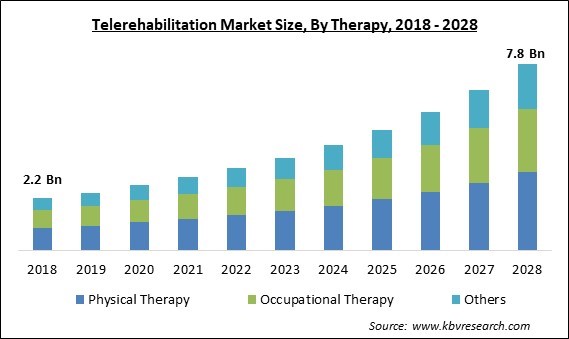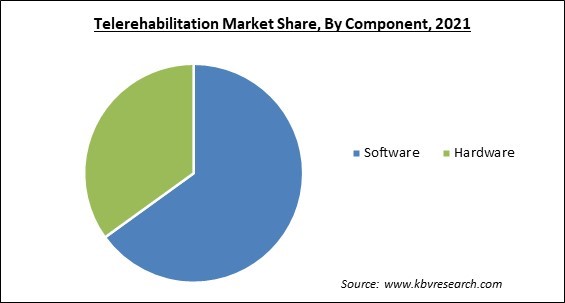The Global Telerehabilitation Market size is expected to reach $7.8 billion by 2028, rising at a market growth of 14.6% CAGR during the forecast period.
The delivery of rehabilitation services over a telecommunications network and the internet is called telerehabilitation, also known as e-rehabilitation. Medical personnel can diagnose patients and deliver therapy from a distance using telerehabilitation services. Among the medical specialties that use telerehabilitation are psychology, audiology, speech-language pathology, occupational therapy, physical therapy, and audiology.

Among the many rehabilitation techniques are exercises for the motor system, goal setting, robotic treatment, speech therapy, virtual reality, and group exercise. Worldwide demand for telerehabilitation services is anticipated to rise as cases of various conditions like traumatic brain injury, cerebrovascular accidents, and developmental delays in the pediatric population rise. These ailments limit the patient's ability to move physically, which raises demand for these services.
Additionally, telerehabilitation significantly lowers the amount of money patients must spend on hospital visits to see doctors for rehabilitation services, which is expected to fuel market expansion. Furthermore, it is anticipated that the telerehabilitation market will be driven by the increasing acceptance of digital technologies in the healthcare sector as well as the expansion of smartphones and the internet. Additionally, both governmental and private entities carry global out a number of programs.
Patients who live far from actual rehabilitation institutions can use telerehabilitation technology. As doctors are more inclined to follow up with patients after release, it also reduces the number of frequent visits that patients make to hospitals and rehabilitation centers. Additionally, this lowers the expense of transportation and saves both patients' and doctors' time, giving clients access to real-time recovery therapies in the comfort of their own homes.
Telehealth or telerehabilitation are emerging as efficient and long-lasting methods for precaution, prevention, and treatment to stop the spread of COVID-19 during this pandemic. It is bridging the divide between patients, doctors, and healthcare systems. In order to stop the virus from spreading, it allows everyone, but mainly symptomatic patients, to stay at home and contact doctors online. As a result, hospitals and other medical facilities are growing their telehealth offerings and looking for ways to train their employees. Therefore, the COVID-19 pandemic has had a favorable effect on the telerehabilitation business.
A virtual consultation is a way to receive medical advice without physically seeing the physician. As a result, it is becoming the most practical method of doctor-patient communication. Furthermore, it provides patients with mobility limitations, such as the elderly and those in remote places, with access to healthcare services. Additionally, it offers a chance to save healthcare costs and saves time for both the patient and the carer. Overall, it can offer the general public improved healthcare services, which is the main draw for patients.
People become increasingly susceptible to chronic diseases and physiological dysfunction as they age. This further raises the need for high-quality medical assistance. For the elderly population, who have trouble accessing rehabilitation services due to mobility issues, telerehabilitation provides high-quality treatments and makes it easier for them to do so. During the anticipated period, initiatives done by both public and private organizations are also anticipated to boost market expansion for telerehabilitation.
The most glaring drawbacks of telemedicine or telehealth are the ongoing requirement for more simplified, transparent policies and standards surrounding telehealth practice to make it easier for physicians to implement. The most significant obstacle to telerehabilitation's widespread adoption is reimbursement. Medicare does not pay for telehealth services supplied to patients who reside in nations that have been federally classified as metropolitan areas. All of this may limit market expansion throughout the projected period.
Based on component, the telerehabilitation market is segmented into hardware and software. In 2021, the software segment dominated the telerehabilitation market with the maximum revenue share. The support given to healthcare systems has resulted in a marked increase in the usage of diverse software. Additionally, the software enhances outcomes and encourages increased engagement. The market is expected to expand fastest due to the increasing need for patient care cost reduction, the growing requirement for accurate and timely information acquisition, and the quickly rising medical costs.

By services, the telerehabilitation market is fragmented into clinical assessment, and clinical therapy. The clinical assessment segment acquired a significant revenue share in the telerehabilitation market in 2021. The main goal of clinical assessment in telerehabilitation is to assist the rehabilitation counselor and patients in gathering crucial and pertinent data. It permits accurate assessment and offers data to support the creation of a rehabilitation plan that is suited to the needs, circumstances, and objectives of the client.
On the basis of therapy, the telerehabilitation market is bifurcated into physical therapy, occupational therapy and others. The occupational therapy segment garnered a substantial revenue share in the telerehabilitation market in 2021. Patients with physical, cognitive, and sensory impairments can regain their independence in all facets of everyday living with the use of occupational therapy. During the forecast period, the prevalence of persons with various conditions, such as dementia, Alzheimer's disease, amputations, etc., is anticipated to increase, fueling demand for these software solutions.
Based on application, the telerehabilitation market is categorized into cardiovascular, orthopedic, neurology, pediatric and others. The orthopedic segment projected the maximum revenue share in the telerehabilitation market in 2021. This results from orthopedic doctors quickly adopting telerehabilitation services due to their effectiveness. Telerehabilitation using a machine learning algorithm also resulted in higher patient satisfaction than the orthopedic surgeon's standard rehabilitation. Additionally, several software programs are being created that enable orthopedic surgery patients to track their exercise duration, ambient temperature, and the biomechanics of their active movements. Therefore, the market is predicted to be driven by this.
| Report Attribute | Details |
|---|---|
| Market size value in 2021 | USD 3.1 Billion |
| Market size forecast in 2028 | USD 7.8 Billion |
| Base Year | 2021 |
| Historical Period | 2018 to 2020 |
| Forecast Period | 2022 to 2028 |
| Revenue Growth Rate | CAGR of 14.6% from 2022 to 2028 |
| Number of Pages | 225 |
| Number of Tables | 439 |
| Report coverage | Market Trends, Revenue Estimation and Forecast, Segmentation Analysis, Regional and Country Breakdown, Companies Strategic Developments, Company Profiling |
| Segments covered | Component, Services, Therapy, Application, Region |
| Country scope | US, Canada, Mexico, Germany, UK, France, Russia, Spain, Italy, China, Japan, India, South Korea, Singapore, Malaysia, Brazil, Argentina, UAE, Saudi Arabia, South Africa, Nigeria |
| Growth Drivers |
|
| Restraints |
|
Region wise, the telerehabilitation market is analyzed across North America, Europe, Asia Pacific and LAMEA. In 2021, the North America region led the telerehabilitation market by generating the largest revenue share. The key market expansion drivers are the availability of cutting-edge healthcare technologies and a rise in e-visits. Additionally, the market expansion is fueled by the increased prevalence of chronic illnesses and an advanced healthcare system. Furthermore, the market is growing as a result of technological developments in rehabilitation and growing public awareness of remote patient monitoring. To enhance the entire patient experience, market participants are concentrating on telerehabilitation service quality improvement.
Free Valuable Insights: Global Telerehabilitation Market size to reach USD 7.8 Billion by 2028
The market research report covers the analysis of key stake holders of the market. Key companies profiled in the report include Cisco Systems, Inc., Koninklijke Philips N.V., Hinge Health, Inc., MIRA Rehab Limited, Jintronix, Care Innovations, LLC, Medvivo Group Ltd. (HealthHero Group Limited), Doctor on Demand, Inc. (Included Health, Inc.), and PT Genie.
By Application
By Therapy
By Component
By Services
By Geography
The global Telerehabilitation Market size is expected to reach $7.8 billion by 2028.
Progressive shift to virtual consultation are driving the market in coming years, however, Poor reimbursement policies are becoming a hurdle restraints the growth of the market.
Cisco Systems, Inc., Koninklijke Philips N.V., Hinge Health, Inc., MIRA Rehab Limited, Jintronix, Care Innovations, LLC, Medvivo Group Ltd. (HealthHero Group Limited), Doctor on Demand, Inc. (Included Health, Inc.), and PT Genie.
The expected CAGR of the Telerehabilitation Market is 14.6% from 2022 to 2028.
The Physical Therapy segment acquired maximum revenue share in the Global Telerehabilitation Market by Therapy in 2021 thereby, achieving a market value of $3.3 billion by 2028.
The North America market dominated the Global Telerehabilitation Market by Region in 2021, and would continue to be a dominant market till 2028; thereby, achieving a market value of $2.9 billion by 2028.
Our team of dedicated experts can provide you with attractive expansion opportunities for your business.

